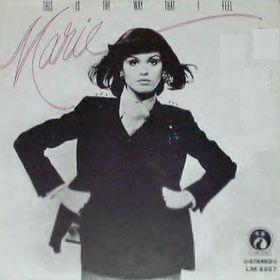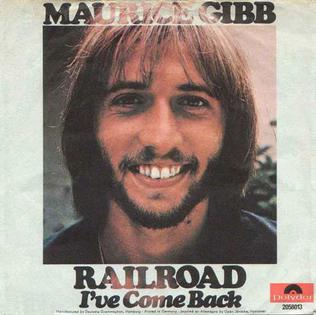Related Research Articles

The Bee Gees were a musical group formed in 1958 by brothers Barry, Robin, and Maurice Gibb. The trio were especially successful in popular music in the late 1960s and early 1970s, and later as prominent performers in the disco music era in the mid- to late 1970s. The group sang recognisable three-part tight harmonies: Robin's clear vibrato lead vocals were a hallmark of their earlier hits, while Barry's R&B falsetto became their signature sound during the mid- to late 1970s and 1980s. The group wrote all their own original material, as well as writing and producing several major hits for other artists, and are regarded as one of the most important and influential acts in pop-music history. They have been referred to in the media as The Disco Kings, Britain's First Family of Harmony, and The Kings of Dance Music.

Robin Hugh Gibb was a British singer, musician and songwriter. He gained worldwide fame as a member of the Bee Gees pop group with elder brother Barry and fraternal twin brother Maurice. Robin Gibb also had his own successful solo career. Their youngest brother Andy was also a singer.

Maurice Ernest Gibb was a British musician. He achieved worldwide fame as a member of the pop group Bee Gees. Although his elder brother Barry Gibb and fraternal twin brother Robin Gibb were the group's main lead singers, most of their albums included at least one or two songs featuring Maurice's lead vocals, including "Lay It on Me", "Country Woman" and "On Time". The Bee Gees were one of the most successful pop-rock groups of all time.

Sir Barry Alan Crompton Gibb is a British musician, singer, songwriter and record producer. He rose to worldwide fame as a member of the Bee Gees, one of the most commercially successful groups in the history of popular music. With his younger brothers, fraternal twins Robin and Maurice Gibb, he formed a musical partnership beginning in 1955. He has lived in Britain, Australia, and the United States, holding dual UK–US citizenship, the latter since 2009.

"Islands in the Stream" is a song written by the Bee Gees and recorded by American country music artists Kenny Rogers and Dolly Parton. Named after an Ernest Hemingway novel, it was released in August 1983 as the first single from Rogers's album Eyes That See in the Dark. The song was originally written for Diana Ross in an R&B style but later reworked for the duet by Rogers and Parton. The Bee Gees released a live version of the song in 1998 and a studio version in 2001.

"Night Fever" is a song written and performed by the Bee Gees. It first appeared on the soundtrack to Saturday Night Fever on RSO Records. Producer Robert Stigwood wanted to call the film Saturday Night, but singer Robin Gibb expressed hesitation at the title. Stigwood liked the title Night Fever but was wary of marketing a movie with that name. The song bounded up the Billboard charts while the Bee Gees’ two previous hits from Saturday Night Fever soundtrack were still in the top ten. The record debuted on the Billboard Hot 100 Chart at #76, then leaped up 44 positions to #32. It then moved: 32–17–8–5–2–1. It remained at #1 for eight weeks, and ultimately spent 13 weeks in the top 10. For the first five weeks that "Night Fever" was at #1, "Stayin' Alive" was at #2. Also, for one week in March, Bee Gees related songs held five of the top positions on the Hot 100 chart, and more impressively, four of the top five positions, with "Night Fever" at the top of the list. The B-side of "Night Fever" was a live version of "Down the Road" taken from the Bee Gees 1977 album, Here at Last... Bee Gees... Live.

"Please, Please, Please" is a rhythm and blues song performed by James Brown and the Famous Flames. Written by Brown and Johnny Terry and released as a single on Federal Records in 1956, it reached No. 6 on the R&B charts. The group's debut recording and first chart hit, it has come to be recognized as their signature song.
"Please Don't Go Girl" is a 1988 song by American boyband New Kids on the Block. The lead vocals were sung by Joey McIntyre, Jordan Knight, and spoken by Danny Wood, but the majority of the lyrics were sung by Joey McIntyre. Written and produced by Maurice Starr, it was the first release from their second album, Hangin' Tough (1988), and also became the group's first commercial hit. "Please Don't Go Girl" first rose from #62 to #46, on the US Billboard Hot 100 singles chart during the week of July 30, 1988. The single was the first major commercial exposure of the group, resulting in somewhat of a slow, but steady climb. The single eventually peaked at #10 the week of October 8, 1988. In 1997, Aaron Carter covered this song and was featured on his international self-titled debut album.

Their Greatest Hits: The Record is the career retrospective greatest hits album by the Bee Gees, released on UTV Records and Polydor in November 2001 as HDCD. The album includes 40 tracks spanning over 35 years of music. Four of the songs were new recordings of classic Gibb compositions originally recorded by other artists, including "Emotion", "Heartbreaker", "Islands in the Stream", and "Immortality". It also features the Barry Gibb duet with Barbra Streisand, "Guilty", which originally appeared on Streisand's 1980 album of the same name. It is currently out of print and has been supplanted by another compilation, The Ultimate Bee Gees.

"How Can You Mend a Broken Heart" is a song released by the Bee Gees in 1971. It was written by Barry and Robin Gibb and was the first single on the group's 1971 album Trafalgar. It was their first US No. 1 single and also reached No. 1 in Cashbox magazine for two weeks.

Olivia Newton-John's Greatest Hits is the first greatest hits album by Olivia Newton-John released in 1977. In some regions, this followed the 1974 compilation, First Impressions and therefore titled as Greatest Hits Vol. 2.

"Shadow Dancing" is a disco song performed by English singer-songwriter Andy Gibb. The song was released in April 1978 as the lead single from his second studio album of the same name. The song reached number one for seven weeks on the Billboard Hot 100 in 1978. Albhy Galuten arranged the song with Barry Gibb. While Andy Gibb would have three more Top 10 hits in the U.S., this would be his final chart-topping hit in the United States. The song became a platinum record.
"Christmas (Baby Please Come Home)" is a pop song originally sung by Darlene Love and included on the 1963 seasonal compilation album, A Christmas Gift for You from Phil Spector. The song was written by Ellie Greenwich, Jeff Barry, and Phil Spector.

"Grease" is a song written by Barry Gibb and recorded by Frankie Valli : it was released as a single in May 1978. It is the title song for the musical motion picture Grease of that year, which was in turn based on the 1971 stage play Grease. Valli's song message celebrates the greaser lifestyle, and it sold over seven million copies worldwide and appeared twice on the film's soundtrack, first as the opening track and again as the closing track. "Grease" was one of four songs written specifically for the film that had not been in the stage production.

"Please Don't Tease" is a 1960 song recorded by Cliff Richard and the Shadows. Recorded in March and released as a single in June, the song became their third No. 1 on the UK Singles Chart spending three weeks at the summit. The song was written by the Shadows' rhythm guitarist Bruce Welch together with Pete Chester.

"Run to Me" is a song by the Bee Gees, the lead single and first track on the group's album To Whom It May Concern (1972). The song reached the UK Top 10 and the US Top 20.

This Is the Way That I Feel is the name of the fourth solo studio album released by American country music singer, Marie Osmond. This was Osmond's first album under the Polydor/Kolob label, following her departure from MGM Records. It was released in April 1977 and would be her last solo studio album for eight years.

"Railroad" is the first solo single released by Maurice Gibb, best known as a member of the Bee Gees. It was released in April 1970. Like the Bee Gees' songs from 1967 to 1972, the single was released by Polydor in most parts of the world while in the US and Canada it was released by Atco. In Canada it was also released by Atlantic and Cotillion. Gibb did not release a follow-up single until 1984 when he released "Hold Her in Your Hand".
"The Bells" is a rhythm and blues song written by Billy Ward and Rose Ann Marks and recorded by Billy Ward and His Dominoes in 1952, featuring Clyde McPhatter on lead tenor. It was released on Federal Records as the B-side of the group's single "Pedal Pushin' Papa". It was a bigger hit than the A-side, reaching #3 on the R&B chart.
"Please Love Me Forever" is a song written by John Malone and Ollie Blanchard. The song was originally released by Tommy Edwards in 1958. Hit versions were later released by Cathy Jean and the Roommates in 1960 and Bobby Vinton in 1967.
References
- ↑ Gibb Songs 2002
- ↑ "Billboard Hits of the World". Billboard . Prometheus Global Media. 8 February 2003. p. 44. Retrieved 4 December 2014.